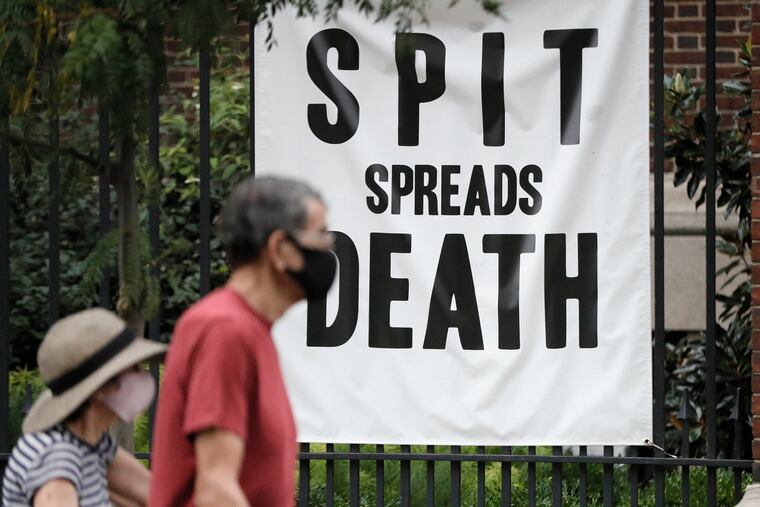COVID-19 shaming, like sex shaming, is bad for public health | Opinion
None of us should use language to suggest we’re invincible to infection.

It only took one day after Mayor Jim Kenney released new COVID restrictions for my Instagram feed to flood with local businesses’ uncertain futures. While they varied in their takes on the shutdowns, they all showed the power of language in shaping our attitudes toward the continued pandemic.
Starr Restaurants posted a message of hope: “This is just a temporary setback so that we can make bigger strides forward as a community against the pandemic.” While such statements acquiesce to the restrictions that went into effect Nov. 20, they maintain a strong sense of community.
Other businesses met the restrictions with more resistance. Subversus Fitness in Center City took to social media with a letter to the City of Philadelphia: “The immediate focus must be on data-informed efforts to reduce the spread with masks, tracing and distance while also enhancing survivability of infected people” they wrote. Another gym, Warhorse Barbell in Northern Liberties, targeted Kenney specifically. In the post, Warhorse claimed that since reopening, they have zero confirmed cases or outbreaks.
» READ MORE: For latest round of coronavirus restrictions, officials are counting on Philadelphians to do the right thing
As a sex educator, I’m familiar with the language used within these letters. It mirrors the language I use in my work to destigmatize sexually transmitted infections (STIs). Public and sexual health invest in prevention, but also need to reframe their arguments from an abstinence and shame-based mind-set (which we know doesn’t work) to one that is approachable and truthful.
While I agree with the gyms’ arguments that city guidelines have been conflicting and ambiguous, I dispute one notion: No one can claim to have zero COVID cases or outbreaks at their business. They can only claim that they have zero known cases, outbreaks, or exposures.
The media saturate viewers with symptoms and clinical discussion around COVID in the same way that sex education classrooms induce fear among students about STIs. At this point in the pandemic, words like spread, transmission, protection, tested, and infected can be numbing. So numbing that there is little awareness of their impact. But the subtle difference between phrases like cases and known cases matters. One projects a certainty we all wish we had right now — when in reality we don’t.
We’re uncertain, we’re afraid. Our lives and our livelihoods are at stake. People fear testing positive for COVID in the same vein as they might fear testing positive for herpes. For that reason, many are either not getting tested, or fear disclosing their results or risk factors to their communities due to internalized shame.
COVID and herpes simplex virus (HSV) are two viruses with different symptoms and potential outcomes. However, there is overlap in how society interprets those who test positive. If you test positive for herpes, society tells you that you must’ve done something wrong. There is an assumption that you either didn’t wear a condom or slept with too many people. If you test positive for COVID, many will assume that you either didn’t wear a mask or didn’t socially distance.
» READ MORE: As COVID restrictions resume, Philly restaurant owners are again denied a seat at the table | Opinion
COVID and herpes share in a conversation of ethics and assumed fault as viruses. There is some stigma in receiving a positive diagnosis. Like herpes, COVID can remain asymptomatic or produce symptoms. As barriers like condoms are not 100% effective at reducing spread of STIs (like herpes) through skin-to-skin contact, a mask offers similar efficacy levels in reducing COVID transmissions. Herpes (which is not included when you ask at clinics to be “tested for everything”) and COVID leave more questions than answers around which tests are more reliable. Although herpes does not potentially result in death like COVID, both viruses do not currently have a cure.
While these businesses do not hold evidence of a COVID outbreak within their communities, there is always risk. In the same way that there are no guarantees if you use barriers and receive regular STI screenings, socially distancing, wearing a mask, and monitoring temperatures are not absolute protections. None of us should use language to suggest we’re invincible to infection. Whether intentionally or not, it suggests that people only get infected because of personal failures.
» Here are Philly’s current COVID-19 guidelines: inquirer.com/phillyguidelines
The way we talk to our communities about COVID matters now more than ever. Instead of claiming that our businesses are entirely “safe,” we need to be asking how we not only stay safer, but also how we tackle this pandemic without creating shame and assumption.
Emily L. Depasse is a sexologist and sex therapy graduate student redefining the narratives around STIs who has written for Women’s Health, Teen Vogue, Bitch, and more. @sexelducation